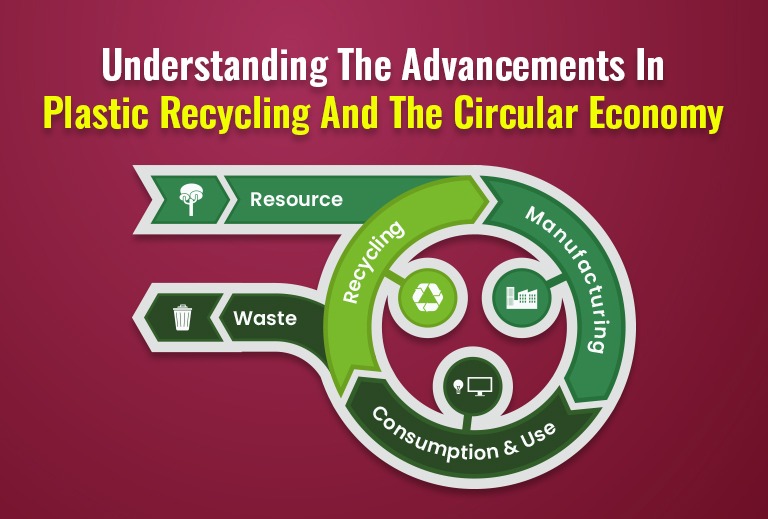Understanding The Advancements In Plastic Recycling And The Circular Economy
Numerous plastic manufacturers have experienced significant progress in developing innovative recycling technologies that promote a circular economy.
For those who are unaware, “circular economy” is an economic model that maximizes the value of resources by keeping them in use for as long as possible, thus minimizing waste generation. It is a departure from the traditional linear economy, where resources are extracted, used, and then disposed of as waste.
This is crucial for the plastic industry as it helps reduce the enormous amount of plastic waste that ends up in landfills, incinerators, and oceans. Embracing a circular economy allows the plastic industry to conserve valuable resources such as fossil fuels by extending the life of plastics through recycling and repurposing.
Here are some of the key advancements in plastic recycling that contribute to a circular economy:
- Improved sorting techniques
Efficient sorting and separation of different types of plastic waste are crucial for effective recycling. Businesses use technologies such as optical sorting, near-infrared spectroscopy, and automated systems to streamline the sorting process.
- Closed-loop recycling systems
These systems involve creating a circular pathway for plastic materials. It aims to recycle plastic waste into new products of equal or higher value, thereby reducing the need for virgin materials. By establishing such systems, the lifespan of plastic materials is extended, reducing the demand for new plastics and minimizing waste generation.
- Biodegradable and compostable plastics
These plastics can break down naturally through biological processes. This can be achieved in industrial composting facilities or in home composting systems. They provide alternatives to traditional plastics and help reduce the accumulation of plastic waste in the environment.
- Chemical recycling
It involves breaking down plastic waste into its basic chemical components. These are then used to produce new plastic or other valuable products. Chemical recycling helps overcome the limitations of mechanical recycling and expands the range of plastics that can be effectively recycled.
Many governments and organisations have run educational campaigns about plastic recycling. This has helped to empower individuals to make informed choices, actively encouraging them to help create a sustainable future.
Interested to learn more about plastic recycling? Save the date for Plastivision 2023, an event dedicated to exploring the cutting-edge developments in plastic recycling. From December 7th to 11th, join us at the Bombay Exhibition Centre in Mumbai for a first-hand look at the future of the plastic industry.
Connect with industry leaders, network with professionals, and discover the latest trends shaping the sector. We look forward to meeting you soon!
Leave a Reply Cancel reply
Recent Posts
- Understanding The Materials That Are Used To Build Plastic Toys
- All You Need To Know About Food-grade Plastics
- A Glance At The Materials That Boost The Performance Of Plastics
- Understanding The Importance Of Exploring New Business Opportunities In The Plastic Industry
- Understanding The Importance Of Investing in R&D For The Plastic Industry
Categories
- 3D Printing
- AIPMA
- Automation
- Automobile Sector
- Bio Plastics
- Environment
- Innovations In Recycling
- Latest Innovations
- Molds & Dies
- News
- Packaging Industry
- Plastic
- Plastic Application
- Plastic Industry
- Plastic Market
- Plastic Myths
- Plastic News From The World
- Plastic Packaging
- Plastic Products
- Plastic Recycling
- Plastic Solar Cells
- Plastic Toys
- Plastic Waste
- Plastic World
- Plastics
- Plastics And Their Applications
- Plastics In Agriculture
- Plastics In Healthcare
- Plastics In Medical Industry
- Plasticulture
- Processing Machinery
- Recycling Machines
- Robotics
- Uncategorized
- Virtual Reality
Archives
- November 2023 (3)
- October 2023 (2)
- September 2023 (3)
- August 2023 (3)
- July 2023 (3)
- June 2023 (3)
- May 2023 (2)
- April 2023 (2)
- March 2023 (2)
- February 2023 (2)
- January 2023 (2)
- December 2022 (3)
- November 2022 (1)
- October 2022 (1)
- September 2022 (2)
- August 2022 (1)
- July 2022 (3)
- May 2022 (3)
- March 2022 (2)
- February 2022 (1)
- January 2022 (1)
- September 2021 (2)
- August 2021 (3)
- July 2021 (4)
- June 2021 (4)
- May 2021 (3)
- April 2021 (2)
- March 2021 (4)
- November 2019 (8)
- October 2019 (8)
- September 2019 (8)
- August 2019 (8)
- July 2019 (8)
- June 2019 (8)
- May 2019 (8)
- April 2019 (8)
- March 2019 (8)
- February 2019 (11)
- January 2019 (8)
- December 2018 (8)
- November 2018 (12)
- October 2018 (12)

